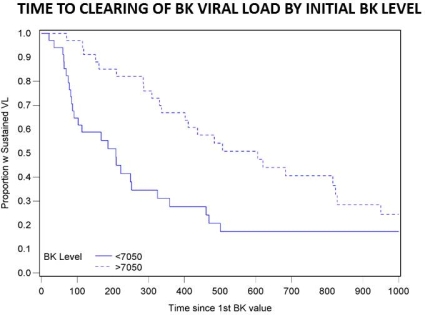Evaluation of Polyomavirus (BK) Treatment and Clinical Outcomes in Pediatric Kidney Transplant Recipients: A >10 Year Single Center Retrospective Experience.
1Children's Healthcare of Atlanta, Atlanta, GA
2Division of Pediatric Nephrology, Emory University School of Medicine, Atlanta, GA.
Meeting: 2016 American Transplant Congress
Abstract number: D231
Keywords: Kidney transplantation, Nephropathy, Pediatric, Polyma virus
Session Information
Session Name: Poster Session D: Polyomavirus
Session Type: Poster Session
Date: Tuesday, June 14, 2016
Session Time: 6:00pm-7:00pm
 Presentation Time: 6:00pm-7:00pm
Presentation Time: 6:00pm-7:00pm
Location: Halls C&D
BK viremia (BKV) is a serious infectious complication after kidney transplantation and can lead to BK nephropathy (BKN) and allograft loss. We reviewed our experience to define the incidence of BKV and BKN in pediatric kidney transplant recipients and to analyze the treatment strategies and patient/allograft outcomes.
Methods: An IRB-approved retrospective review from 1/1/2004-11/30/2014 of kidney transplant recipients aged 0-21 years with BKV confirmed by serum polymerase chain reaction (PCR) was performed.
Results: Of 315 kidney transplant recipients, 68 (21.5%) showed a sustained positive BK PCR. Of patients with sustained BKV 17/68 (25%) had biopsy proven BKN. Three of these patients developed graft loss and eventually underwent retransplantation. The median BK PCR at presentation was 7050 copies/mL. BKV patients were compared to those who developed BKN and no differences were observed in baseline demographics. All patients had temporary ureteral stents. BKN patients were more likely to have a higher BK PCR (p<0.01) and a higher serum creatinine (p<0.01) at presentation. Patients with BK PCR higher than the median also took longer to clear BKV, with half of these patients requiring >500 days to achieve undetectable BK PCR.  Various overlapping treatment strategies for BK were used during the study period including reduced immunosuppression (n=68), IVIG (n=5), cidofovir (n=11), ciprofloxacin (n=6), and leflunomide (n=36). All BKN patients were treated with leflunomide in lieu of mycophenolate at an average starting dose of 0.43 mg/kg/dose.
Various overlapping treatment strategies for BK were used during the study period including reduced immunosuppression (n=68), IVIG (n=5), cidofovir (n=11), ciprofloxacin (n=6), and leflunomide (n=36). All BKN patients were treated with leflunomide in lieu of mycophenolate at an average starting dose of 0.43 mg/kg/dose.
Conclusions: Of 315 pediatric renal transplants at our center, 21.6% developed BKV. Progression to BKN occurred in 25% of these. Our data indicate that early, routine screening to identify BKV and aggressive strategies to ameliorate BKV when BK PCR approaches 7000 copies/mL may help accelerate clearance of BK viremia and subsequently may reduce BKN and allograft loss.
CITATION INFORMATION: Liverman R, Kraus E, Garro R, Warshaw B, Winterberg P, George R. Evaluation of Polyomavirus (BK) Treatment and Clinical Outcomes in Pediatric Kidney Transplant Recipients: A >10 Year Single Center Retrospective Experience. Am J Transplant. 2016;16 (suppl 3).
To cite this abstract in AMA style:
Liverman R, Kraus E, Garro R, Warshaw B, Winterberg P, George R. Evaluation of Polyomavirus (BK) Treatment and Clinical Outcomes in Pediatric Kidney Transplant Recipients: A >10 Year Single Center Retrospective Experience. [abstract]. Am J Transplant. 2016; 16 (suppl 3). https://atcmeetingabstracts.com/abstract/evaluation-of-polyomavirus-bk-treatment-and-clinical-outcomes-in-pediatric-kidney-transplant-recipients-a-10-year-single-center-retrospective-experience/. Accessed June 30, 2025.« Back to 2016 American Transplant Congress
